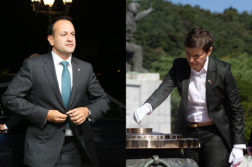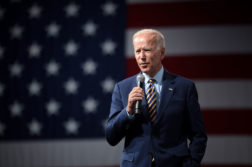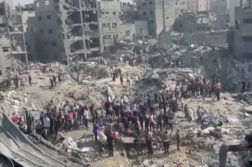Perched on the western rim of the Melanesian Pacific, adjacent to independent Papua New Guinea, is West Papua. Here, in a land so diverse that you can stand on a tropical glacier 15,000 feet high and peer down on the equator, indigenous Papuans are waging a four-decade long struggle for independence from Indonesia. At the heart of Papuan grievances lies Freeport, the world’s largest gold and copper mine, owned and operated by US based company Freeport McMoRan and their Indonesian subsidiary PT Freeport Indonesia.
Recently trouble at the mine flared up again, as around 12,000 Indonesian and Papuan Mine workers and contractors went on strike, joined by local indigenous leaders. Walking off a job has never been so hard, Yan Ampnir told us. When he decided to join the mine workers’ strike in the remote Indonesian province of Papua, it was not a simple case of heading out the gate and driving home to his family. It involved a gruelling 40-mile trek down a roller-coaster road that plunges 8400 feet down from the vertiginous cloud-cloaked mountain walls of Tembagapura, the remote mine base camp, to the sprawling swamp lowlands of Timika.
Tembagapura is a company town. The only people who live there are mine workers. After long shifts in the Grasberg open pit or in the underground mine, workers are bussed on four-wheel drive trucks back to Timika or the US lookalike suburb of Kuala Kencana, replete with shopping malls, manicured lawns and street lights, all carved out of the middle of the jungle. So, when the company refused to bus the workers outside the Indonesian military- guarded mine area, Ampnir and his compatriots picked up their bags and started walking.

Strike leaving Tembagapura. SPSI collection. |
Seventeen hours later the first group arrived in Timika; tired, wet, cold and hungry. Eight days later the strike ended. In the process some 12,000 mine workers (of a total workforce of 23,000) halted production at the world’s largest gold and copper mine, inflicting a loss of US$95,000 per day on US-based Freeport McMoRan, Indonesian subsidiary PT Freeport Indonesia and their Anglo Australian partner, Rio Tinto.
After a quick search online, Albar Sabang, the local union branch secretary, hands us an Excel spreadsheet. On it is a list of pay scales. Sabang is a mechanic who fixes heavy machinery like bulldozers and excavators. He has worked for PT Freeport Indonesia since 1994 and earns US$3.00 per hour. He is one of the highest paid local employees out of a group PTFI calls "non-staff". Others earn as little as $1.80 per hour, a wage that rose 98 per cent after a similar workers strike in April 2007.

Strike arriving in Timika. SPSI collection. |
Sudiro (his only name) is a softly spoken tall Javanese man, unassuming in person. He is the local SPSI (Seluruh Pekerja Serikat Indondesia — or All Indonesian Workers Union) chair of the Freeport Mine Workers Union, an affiliate with the national SPSI network. Recently sacked by PT Freeport Indonesia for organising workers, he only just got his job back. "Of all the Freeport mines", Sudiro tells us, "PT Freeport Indonesia is the most profitable. It has the lowest production costs. But workers are paid the lowest salaries. We are even paid less than Freeport mine workers in Mongolia and the Democratic Republic of Congo. That’s not right."

Strike leader Sudiro. SPSI collection. |
Freeport is emblematic of much that is wrong in West Papua.
The company’s Contract of Work was signed in 1967, two years before the Act of Free Choice was concluded, a referendum that was supposed to give the indigenous West Papuans a chance to say whether they wanted to be independent or part of Indonesia. In fact, there was no vote. Instead, 1022 West Papuans, less than 0.01 per cent of the population, were corralled into camps and told to "vote" for integration with Indonesia or have "their tongues cut out". But it was not just the Indonesian government that consented to democratic fraud writ large; the US, Australian and European governments were also not prepared to contest the election or risk stability in the region for what one US Embassy source at the time called a handful of "Stone-Age illiterate tribal groups".
The biggest prize of all was Freeport.
Suharto declared the company a national asset and instructed the military to guard the mine, which led to a long history of human rights violations, including un-investigated mass killings, theft of Papuan land and massive environmental degradation — all of which has led to ongoing violent and nonviolent resistance.
This was the era before the notion of "free, prior, and informed consent" became best practice for extractive industries. According to local indigenous landowners, they still feel that they have not been consulted or their rights respected.
As the Amungme people’s sacred mountain is consumed, tailings are dumped in the Ajkwa River at the rate of 200,000 tons a day. The result: over 30,000 hectares of rainforest have been wiped out and huge levee banks built to stop Timika from being smothered by sludge waste. In the process, Freeport became a lightning rod for all Papuan grievances.
This is the first article of a two-part series on industrial action and Freeport in West Papua.
Like this article? Register as a New Matilda user here. It’s free! We’ll send you a bi-weekly email keeping you up to date with new stories on the site. And you can like New Matilda on Facebook here.
Want more independent media? New Matilda stays online thanks to reader donations. To become a financial supporter, click here.
This article was originally published on Open Democracy here.
Donate To New Matilda
New Matilda is a small, independent media outlet. We survive through reader contributions, and never losing a lawsuit. If you got something from this article, giving something back helps us to continue speaking truth to power. Every little bit counts.



